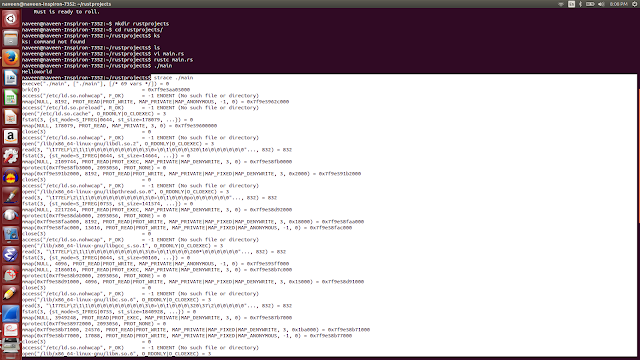This is something programming students can try to collaborate with self motivated programmers.
https://www.recurse.com/blog/77-hacker-school-is-now-the-recurse-center
Tuesday, May 31, 2016
Monday, May 30, 2016
How to start with RUST LANG in linux machine
I am started hearing about RUST programming language http://doc.rust-lang.org/book/README.html, so thought of give a try 'helloworld' program.
The impressive thing is,the language focus on safety,speed and concurrency.
Rust is a systems programming language focused on three goals: safety, speed, and concurrency. It maintains these goals without having a garbage collector, making it a useful language for a number of use cases other languages aren’t good at: embedding in other languages, programs with specific space and time requirements, and writing low-level code, like device drivers and operating systems
There is very good documentation - http://doc.rust-lang.org
Below is the installation steps, helloworld program . I gave a 'Strace' on the program to see any difference.I couldn't understand any difference :-).. i dont know how to find the difference in speed or concurrency.. need to read more ...


Rust is a systems programming language focused on three goals: safety, speed, and concurrency. It maintains these goals without having a garbage collector, making it a useful language for a number of use cases other languages aren’t good at: embedding in other languages, programs with specific space and time requirements, and writing low-level code, like device drivers and operating systems
There is very good documentation - http://doc.rust-lang.org
Below is the installation steps, helloworld program . I gave a 'Strace' on the program to see any difference.I couldn't understand any difference :-).. i dont know how to find the difference in speed or concurrency.. need to read more ...


Sunday, May 29, 2016
Unconventional way of studying things..
Sometimes I think that I studied lot of things in engineering text books, but don't have any clue on how the concepts/formula derived or how much analysis they put behind on those concepts.That research or hacking experience generally missing in text books. Sorry ..I am not saying school/college text books are bad. We ( as students) always needs to read text books .. but what I am trying to convey is... sometimes textbooks are missing practical possibilities of formulas or concepts.
There comes the importance of unconventional way of studying things.. or the hackers(in good sense) way of mastering the interested areas. Our schools and colleges should give these kind of opportunities for students.
Okay.....
These things came to my mind when I was watching the below video...
She (http://jvns.ca ) explains the tool 'strace'
I tried 'strace' against our normal linux command 'ls'. This actually listed me amazing tracing log ...
This is just an example .All concepts that we are studying/hearing should have unconventional way of mastering it or we should at least try to develop it !!!
None of the computer text books might have taught you on, what actually happens behind the 'ls' command. But the unconventional way is, find out some tool which can list the activities behind 'ls' and mastering what is it doing.... obviously it is very difficult, but it gives you the full concepts behind the 'ls' upto very low/machine level.
Unconventional way of studying things opens opportunities which are not described in most of the text books That gives you the confidence to question the actual concepts or current implementation.
But it will have some initial difficulties and extra research out of your text books or tutorials. But I am sure that there will be always some supporting tools/methods which somebody might have implemented already or you can implement such a method if it's not there!! :-)
Below is the screenshot of 'strace' on 'ls' in command line
some research on each system calls behind means ..
There comes the importance of unconventional way of studying things.. or the hackers(in good sense) way of mastering the interested areas. Our schools and colleges should give these kind of opportunities for students.
Okay.....
These things came to my mind when I was watching the below video...
She (http://jvns.ca ) explains the tool 'strace'
I tried 'strace' against our normal linux command 'ls'. This actually listed me amazing tracing log ...
This is just an example .All concepts that we are studying/hearing should have unconventional way of mastering it or we should at least try to develop it !!!
None of the computer text books might have taught you on, what actually happens behind the 'ls' command. But the unconventional way is, find out some tool which can list the activities behind 'ls' and mastering what is it doing.... obviously it is very difficult, but it gives you the full concepts behind the 'ls' upto very low/machine level.
Unconventional way of studying things opens opportunities which are not described in most of the text books That gives you the confidence to question the actual concepts or current implementation.
But it will have some initial difficulties and extra research out of your text books or tutorials. But I am sure that there will be always some supporting tools/methods which somebody might have implemented already or you can implement such a method if it's not there!! :-)
Below is the screenshot of 'strace' on 'ls' in command line
some research on each system calls behind means ..






